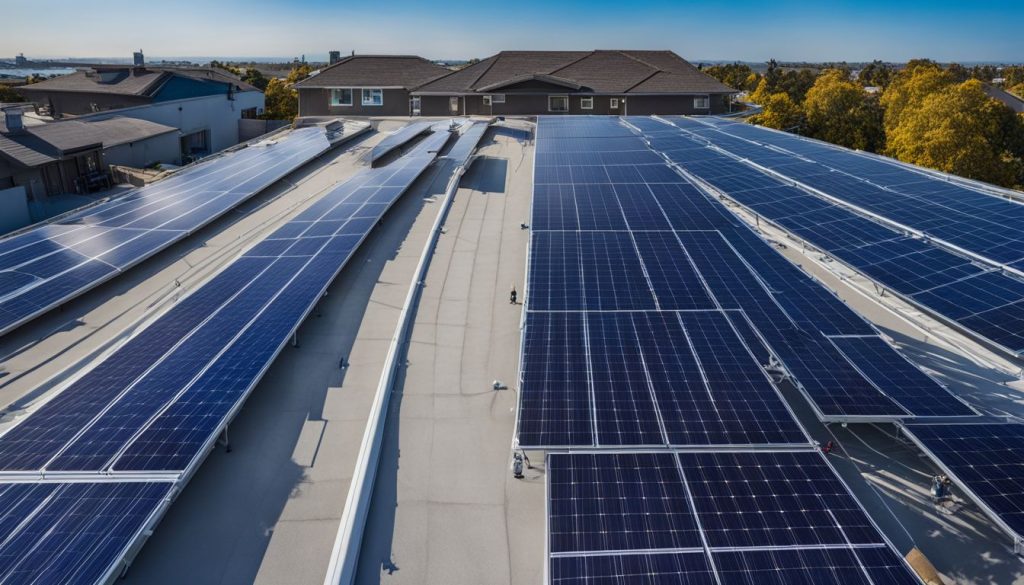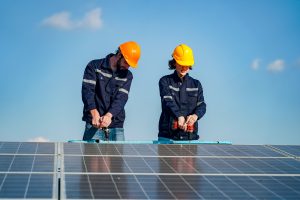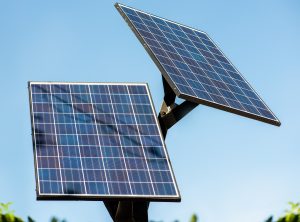Are you interested in saving money on your energy bills while reducing your carbon footprint? Solar panels are a key component of this eco-friendly transformation. This comprehensive guide discusses everything from the different types of solar panels and their costs to installation procedures and benefits.
Keep reading, as we unlock the potential of harnessing solar power for your home!
Key Takeaways
- Solar panels turn sunlight into electricity using photovoltaic cells, saving money on energy bills and reducing carbon footprint.
- There are different types of solar panels, including monocrystalline, polycrystalline, PERC panels, and thin-film variations like cadmium telluride, amorphous silicon, and copper indium gallium selenide.
- When choosing solar panels, important factors to consider include efficiency, power capacity, cost, durability and resistance to temperature and weather.
- Solar panel costs can vary depending on factors such as type, efficiency and system size. On average the cost ranges from $15k-$25k for a typical home installation.
Understanding Solar Panels

Solar panels are devices that convert sunlight into electricity, using photovoltaic cells to capture and generate energy.
What is a solar panel?
A solar panel is a tool that turns sunlight into electricity. It has small pieces called photovoltaic cells. These cells use the sun’s energy to make power you can use at home. This type of clean energy is good for our world and helps you save on your bills too.
Companies like Suntapped Energy offer great options for solar panels, making it easy to go green!
How do solar panels work?
Solar panels use the sun’s light to make power. This is called the photovoltaic effect. The solar panel has many cells that catch this light. They are made of special stuff that takes in photons from the sunlight.
When they take in these photons, they let out tiny bits called electrons. These electrons rush around and turn into an electric current we can use at home! A single solar panel has lots of these cells linked up together, forming a team to make more power for you.
If you need even more energy, you can link several panels together to create a big solar system!
Types of Solar Panels

There are several types of solar panels available including monocrystalline, polycrystalline, PERC panels, and thin-film variations such as cadmium telluride, amorphous silicon, and copper indium gallium selenide.
Monocrystalline solar panels
Monocrystalline solar panels use a single crystal structure to catch sunlight. They turn it into electric power better than other types of solar panels. These are also great for people who want their roof to look good, because they have a clean black color.
If you want something that lasts long, choose this type too. It can give you more energy over time so you save money on your bills. Monocrystalline panels help keep your house green and running smoothly!
Polycrystalline solar panels
Polycrystalline solar panels are a type of solar panel that you can use for your home or business. These panels are made from multiple silicon crystals, which give them a speckled appearance.
While they may have slightly lower efficiency compared to other types of solar panels, like monocrystalline panels, they are still a cost-effective option for generating solar energy.
This means that they can help you save money on your electricity bills while also being environmentally friendly. Suntapped Energy offers polycrystalline solar panels as part of their solar solutions, making it easier for you to switch to renewable energy and enjoy the benefits it brings.
Passivated Emitter and Rear Cell (PERC) panels
PERC panels are a type of solar panel that use special technology to increase their energy production. They are designed to be more efficient than traditional solar panels, meaning they can generate more electricity from the same amount of sunlight.
In fact, PERC panels have higher efficiency compared to other types of solar panels.
One great thing about PERC panels is that they perform well even in low-light conditions. This means they can still produce electricity on cloudy days or during the early morning and late afternoon when the sun is not as strong.
So, even if you live in an area with less sunshine, PERC panels can still help you save money on your electric bill.
Thin-film solar panels (including variations: Cadmium telluride, Amorphous silicon, Copper indium gallium selenide)
Thin-film solar panels, like Cadmium telluride, Amorphous silicon, and Copper indium gallium selenide (CIGS), have some unique advantages. They are flexible and lightweight, making them easier to install and integrate into various materials.
Cadmium telluride is known for its high efficiency and low manufacturing costs. Amorphous silicon performs well in low-light conditions and is adaptable to different environments. CIGS offers high efficiency and can be integrated into building materials.
While thin-film solar panels may not be as efficient as traditional silicon-based ones, they can be more cost-effective and versatile in certain applications.
Factors to Consider in Choosing Solar Panels
When choosing solar panels, it’s important to consider factors such as efficiency, power capacity, cost, durability, and resistance to temperature and weather. To make an informed decision for your home, keep reading!
Efficiency
When choosing solar panels for your home, efficiency is an important factor to consider. The efficiency of a solar panel refers to how well it can convert sunlight into electricity.
Higher efficiency means more power generation, which translates to greater energy savings for you.
Suntapped Energy understands the importance of efficient solar panels and ensures that customers get the best products for their systems. With state-of-the-art equipment and industry expertise, Suntapped Energy delivers reliable and efficient solar solutions.
By designing customized solar systems to maximize energy production and savings, Suntapped Energy aims to provide homeowners with top-notch customer service and high-quality products.
With our focus on energy efficiency, you can trust us to help you harness the power of the sun effectively.
Power capacity
Solar panels vary in their power capacity, which refers to the amount of electricity they can generate. When choosing solar panels for your home, it’s important to consider the power capacity that meets your energy needs.
Suntapped Energy offers a wide range of solar solutions designed to maximize energy production and savings.
By using state-of-the-art equipment and industry expertise, Suntapped Energy delivers reliable and efficient solar solutions with different power capacities. Their expert consultants ensure customers have the best product and pricing suitable for their specific energy requirements.
So whether you want to offset a portion or all of your electricity usage, Suntapped Energy has the right solar panel options to meet your needs.
With Suntapped Energy’s high-quality installations done by top industry installers, you can rest assured that your chosen solar panels will provide optimalperformance and help you save on energy costs.
Cost
One important factor to consider when choosing solar panels is the cost. Suntapped Energy offers transparent pricing for their solar panels, ensuring that customers know exactly what they are paying for.
They also focus on providing high-quality products, which may impact the overall cost of the panels. By offering easy and transparent pricing options, Suntapped Energy aims to make the process of going solar simple and straightforward for homeowners.
So if you’re looking for a company that emphasizes both quality and affordability, Suntapped Energy could be a great option for your solar panel needs.
Temperature and weather resistance
Solar panels need to be able to withstand different weather conditions in order to perform well and last long. They should be able to handle extreme temperatures, including both hot and cold weather.
It’s important for solar panels to be made with durable materials that can resist damage from hail, snow, and strong winds. Some solar panels even have special coatings or treatments that make them more resilient against harsh conditions.
So when choosing solar panels for your home, it’s crucial to consider their temperature and weather resistance factors to ensure they will work effectively no matter the climate you live in.
Durability and ratings
When choosing solar panels for your home, it’s important to consider their durability and ratings. You want panels that can withstand different weather conditions and last for a long time with minimal maintenance.
Suntapped Energy focuses on providing high-quality installations to ensure durability and reliability. They use state-of-the-art equipment and work with top installers in the industry to guarantee high-quality installations and ratings.
This means that you can trust their systems to be robust, reliable, and effective in producing energy for your home. So when considering solar panels, make sure to choose ones that are built to last and have good ratings for longevity, performance, reliability, and quality.
Light-Induced Degradation (LID)
Light-Induced Degradation (LID) is a problem that can happen with solar panels over time. It occurs when certain types of light affect the panels and make them lessefficient. This means that the panels don’t produce as much power as they should.
LID happens because of a chemical reaction within the silicon material of the solar cells. It can cause a reduction in power output by up to 3% in the first few months, but after that, it stabilizes.
The good news is that most reputable solar panel manufacturers have taken steps to reduce LID in their panels, so it’s not as big of an issue as it used to be.
Solar Panel Costs
Solar panel costs can vary depending on factors such as type, efficiency, and system size.
Average cost of solar panels
The average cost of solar panels can vary depending on several factors. On average, the cost of installing solar panels for a typical home ranges from $15,000 to $25,000. However, this price can be offset by various incentives and rebates that are available.
Factors that impact the cost include the size of the system, the type of solar panel chosen, and installation fees. It’s important to note that although there is an upfront cost for purchasing solar panels, they can provide significant long-term savings on electricity bills.
Factors that impact solar panel costs
Solar panel costs can vary based on several factors. Here are some important things to consider:
- Type of solar panels: Different types of solar panels have varying costs. Monocrystalline panels, for example, are usually more expensive than polycrystalline panels.
- System size: The size of your solar system affects the overall cost. A larger system will require more panels and therefore cost more.
- Installation complexity: If your home has a complex roof structure or requires special equipment for installation, it can increase the installation cost.
- Inverter type: Inverters convert the DC power produced by solar panels into usable AC power for your home. The type of inverter you choose can impact the overall cost.
- Location and permits: Local permitting requirements and regulations can affect installation costs. Factors like roof condition and shading also play a role in determining costs.
- Financial incentives: Availability of government incentives, rebates, and tax credits can significantly reduce the upfront cost of installing solar panels.
- Quality and warranty: Higher-quality solar panels may come with a higher price tag but offer better performance and longer warranties.
- Company reputation: Working with an experienced and reputable solar installer may come at a higher cost but ensures quality workmanship and customer satisfaction.
- [IMPORTANT FACTS] 1 – 6
Solar panel cost by type
Solar panel costs can significantly vary depending on the type of solar panel you choose for your home. Here’s an overview of the different types of solar panels and their estimated costs, allowing you to make an informed decision.
| Type of Solar Panel | Average Cost |
| Monocrystalline panels | $1,000 – $2,000 per panel |
| Polycrystalline panels | $700 – $1,500 per panel |
| Passivated Emitter and Rear Cell (PERC) panels | $1,200 – $1,800 per panel |
| Thin-film solar panels (Cadmium telluride, Amorphous silicon, Copper indium gallium selenide) | $600 – $1,200 per panel |
While these costs may seem high upfront, remember that going solar is an investment. At Suntapped Energy, we work hard to ensure you get the best product, pricing, and equipment for your solar system. We offer a wide range of solar solutions and design customized solar systems to maximize your energy production and savings. Our expert consultants are always available to guide you through the solar process and assist in choosing the right type of solar panels for your specific needs.
Solar panel cost by system
The cost of solar panel systems can vary significantly based on the size and type of the system, along with other factors. At Suntapped Energy, we offer a variety of solar solutions for homes and businesses, and our expert consultants can guide you through the process to ensure you get the best product and pricing for your solar system.
| System Size | Average Cost | Energy Production |
| Small (1-2 kW) | $2,500-$4,000 | 100-350 kWh per month |
| Medium (3-5 kW) | $7,600-$12,500 | 300-850 kWh per month |
| Large (6-10 kW) | $15,000-$25,000 | 600-1700 kWh per month |
| Extra Large (10+ kW) | $25,000+ | 1700+ kWh per month |
Remember, these are average costs and can vary based on your location, the type of panels used, and other factors. We design customized solar systems at Suntapped Energy to maximize your energy production and savings.
Solar Financing Options
Explore different payment options for solar panels and learn about the various solar incentives and rebates available to help offset the cost. Discover how you can take advantage of these opportunities to make your switch to solar even more affordable.
Payment options for solar panels
You have several payment options when it comes to solar panels:
- Suntapped Energy offers flexible financing options for solar panels.
- They provide transparent solar financing with clear terms and conditions.
- Affordable solar panel options are available to fit your budget.
- You can choose from different payment plans, including monthly installments.
- Suntapped Energy ensures that customers get the best pricing for their solar system.
- They work with top installers to guarantee high – quality installations.
- Whether you need residential or commercial solar solutions, they have you covered.
- Suntapped Energy designs customized solar systems tailored to your specific energy needs.
- Their goal is to maximize energy production and savings for you.
Solar incentives and rebates
Solar incentives and rebates can help make solar panel installations more affordable for homeowners. Here are some important facts about solar incentives and rebates:
- Government programs: Federal, state, and local governments often offer financial incentives to encourage the adoption of solar energy. These incentives can include tax credits, grants, and rebates.
- Tax credits: One common incentive is the federal Investment Tax Credit (ITC), which allows homeowners to deduct a percentage of their solar panel system costs from their federal taxes. Many states also offer their own tax credits for solar installations.
- Rebate programs: Some utility companies or state agencies provide cash rebates for installing solar panels. These rebates can help offset the upfront costs of purchasing and installing the system.
- Net metering: Another incentive is net metering, where homeowners with solar panels can receive credits on their utility bills for any excess electricity they generate and feed back into the grid.
- Time-sensitive incentives: It’s important to note that some incentives may have expiration dates or limited funding, so it’s best to take advantage of them as soon as possible.
Benefits of Switching to Solar
Switching to solar panels offers significant financial savings, environmental benefits, energy independence, and increased property value. Discover how going solar can transform your home and lifestyle.
Read more!
Financial savings
Switching to solar energy can lead to significant financial savings. By harnessing the power of the sun, you can generate your own electricity and reduce your reliance on traditional utility companies.
This means lower monthly electricity bills and potential long-term cost savings. In fact, studies have shown that homeowners who switch to solar panels can save thousands of dollars over the lifetime of their system.
With Suntapped Energy’s customized solar systems designed for maximum energy production and savings, you can enjoy the benefits of renewable energy while putting money back in your pocket.
Environmental benefits
Switching to solar energy has numerous environmental benefits. Solar panels produce electricity without emitting greenhouse gases, which helps combat climate change. By using renewable and clean energy from the sun, you can reduce your reliance on fossil fuels and contribute to a cleaner environment.
Solar power also reduces air pollution and improves air quality by reducing the need for traditional electricity generation that contributes to pollution of both air and water. Furthermore, solar energy is a sustainable source of power that helps conserve water resources compared to other forms of electricity generation.
Making the switch to solar not only saves you money but also helps protect our planet for future generations by promoting low carbon and environmentally friendly energy options.
Energy independence
Switching to solar energy can offer homeowners the opportunity for energy independence. By harnessing the power of the sun, you can generate your own clean and renewable energy right at home.
This means that you won’t have to rely solely on traditional sources of electricity from the grid, which are often subject to price fluctuations and potential disruptions. With solar panels installed on your property, you can produce your own electricity and reduce dependency on external sources.
This not only provides financial savings in the long run but also gives you more control over your energy usage and contributes to a greener future for our planet.
Increased property value
Switching to solar energy can increase the value of your home. By installing solar panels, you are investing in renewable energy and demonstrating your commitment to sustainable living.
This not only attracts environmentally conscious buyers but also provides them with the long-term benefits of clean energy and reduced carbon footprint. Studies have shown that homes equipped with solar panels tend to sell for more than those without, making it a wise financial decision.
Suntapped Energy understands the importance of maximizing your property’s value and offers customized solar systems designed for optimal energy production and savings. With our top-notch equipment and industry expertise, you can trust us to deliver reliable and efficient solutions that enhance both your home’s appeal and its market worth.
Potential Disadvantages of Solar Panels
Solar panels can have upfront costs that may deter some homeowners from making the switch to solar energy.
Upfront costs
Switching to solar panels may come with upfront costs, but the long-term benefits make it worth considering. While the initial investment can vary depending on factors such as system size and type of panels, Suntapped Energy is committed to providing a seamless and transparent experience for homeowners.
By offering expert consultants who guide customers through the process and partnering with top installers in the industry, Suntapped Energy ensures that you get the best product, pricing, and equipment for your solar system.
Additionally, there are payment options available to help make solar panels more affordable. So even though there may be upfront costs involved with installing solar panels, the financial savings and environmental benefits over time outweigh this initial expense.
Weather dependence
Solar energy is a great way to power your home, but it does have one disadvantage – it depends on the weather. Solar panels need sunlight to generate electricity, so if it’s cloudy or raining, they won’t work as efficiently.
This means that on those days, you might not get as much energy from your solar panels.
Additionally, during winter months when there are shorter days and less sunlight, solar panel output can be lower. The amount of sunlight available also varies depending on where you live and the climate conditions in your area.
Another thing to consider is extreme weather events like hailstorms or heavy snowfall. These can damage your solar panels and affect their performance.
Despite these challenges, solar energy is still a reliable and renewable source of power. It’s just important to be aware that its efficiency can vary based on weather patterns and seasonal variations.
Limited energy storage
One potential disadvantage of solar panels is limited energy storage. Unlike traditional electricity sources, solar panels cannot store excess energy generated during the day for use at night or during cloudy periods.
This means that homeowners may still need to rely on the grid for electricity when their solar panels are unable to generate enough energy. To overcome this limitation, additional energy storage solutions like batteries may be needed.
However, it’s important to note that these storage solutions can add to the overall cost of installing a solar panel system.
Installation Process
Finding a reputable installer, obtaining permits, and installing solar panels – everything you need to know! Read on for a seamless transition to clean energy.
Finding a reputable installer
Suntapped Energy partners with top installers in the industry, ensuring customers get trusted and reliable installation services. Our accredited installation partners are experienced consultants who provide high-quality solar installations.
We prioritize transparent communication and offer affordable pricing options. With Suntapped Energy, finding a reputable installer is easy and hassle-free, making your solar panel journey a smooth one.
Permitting and paperwork
To install solar panels, there are some permitting and paperwork that need to be done. Suntapped Energy takes care of these processes to make it easier for customers. They work with reputable installers who know the local regulations and can handle all the necessary permits.
This ensures that the installation is done legally and up to code. Suntapped Energy also helps with the paperwork involved in applying for any incentives or rebates available for switching to solar power.
They aim to make this part of the process as smooth as possible, so homeowners don’t have to worry about navigating through complex paperwork themselves.
Installing solar panels
Installing solar panels is a straightforward process that can be done by professionals. Here’s what you need to know:
- Find a reputable installer: Look for expert solar consultants, such as Suntapped Energy, who can guide you through the entire installation process.
- Permitting and paperwork: Your installer will handle the necessary permits and paperwork required for the installation, making the process hassle-free for you.
- Seamless solar installation: Suntapped Energy ensures a high-quality installation by partnering with top industry installers who are experienced in installing solar panels.
- Customized solar system design: The company designs customized solar systems to fit your specific energy needs, maximizing energy production and savings.
- Transparent solar experience: With Suntapped Energy, you can expect a transparent and clear process from start to finish, ensuring that you understand every step of the installation process.
Conclusion
Switching to solar panels offers numerous benefits, including financial savings, environmental impact reduction, energy independence, and increasedproperty value. With a wide range of panel types and financing options available, it is important to consider factors such as efficiency, cost, and durability when choosing the right system.
By partnering with Suntapped Energy, customers can be confident in receiving expert guidance throughout the entire process and a customized solar solution that maximizes energy production and savings.
Start your journey towards clean and sustainable energy today!
About Us
Suntapped Energy is a leading solar sales company dedicated to providing a seamless and hassle-free experience for our customers. We understand that going solar can be overwhelming, which is why we partner with the best installers in the industry to offer top-notch customer service and high-quality products. With our in-house expert consultants, we ensure that every step of the process is easy and transparent.




